Digital Animation portfolio
This page offers detailed information about what's required in your portfolio as part of your application to the Digital Animation program. Information on the program itself can be found on the Digital Animation program page.
Applying to the Digital Animation program? The program’s admission requirements include a portfolio submission. Your portfolio helps NSCC evaluate your abilities to ensure you have a reasonable probability of success in this program.
Portfolio contents
Your portfolio consists of the following items, to be submitted digitally:
- Perspective drawings – 1 clean perspective drawing and 1 page of your rough sketch work that shows the horizon line and vanishing points
- 3 life drawings – 2 full body life drawings and 1 page of rough hand sketches
- Character head rotation exercise
- 3 pieces of personal, original artwork
- A storyboard using the provided storyboard template and character design (4 panels)
Perspective drawings
There are two components to this section. Before starting, identify a room to sketch that contains furniture / other objects. Please review the instructions carefully to ensure your submission meets the requirements.
Part 1. Rough Sketch Work
- Content: Include one page of rough perspective sketches of the room. The sketches should showcase your process and planning.
- Requirements: Your rough sketches should clearly demonstrate:
- The horizon line
- Vanishing points
- Perspective guide lines for the room and objects
- Placement and layout of furniture and objects
- This page is meant to illustrate your exploration of the design, showing how you approached the composition and perspective. Your rough sketch work will be evaluated as part of the vanishing point component in the marking rubric.
Part 2. One Clean Perspective Drawing
- Content: Create a detailed, finished perspective drawing of the same interior room you illustrated in your rough sketches.
- Requirements: In this final drawing, include detailed illustration of all furniture and objects in the space, ensuring everything is in correct proportion and follows accurate perspective principles. Use well-defined vanishing points to give your image depth and a realistic, three-dimensional appearance.
Important Notes:
- Both components need to depict the same interior room.
- The rough sketch work shows your process, while the clean perspective drawing represents the final, polished version of the room design.
Tips, tutorials and examples
- View a 2-point perspective tutorial from Hello Artsy
- View a 2-point perspective tutorial from schoolofsketching.com
- View a YouTube video with a 2-point perspective tutorial
- Get as far back as your can to draw the entire room (don't draw close-up).
- View the following examples of student works:
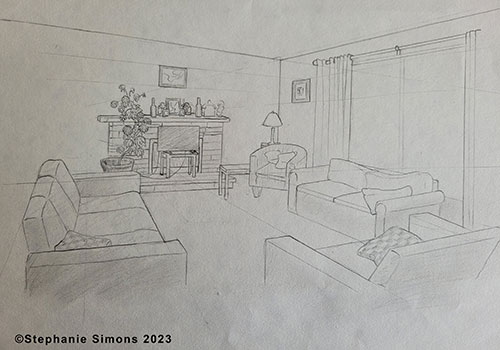
Pictured here: A sketch by Stephanie Simons.
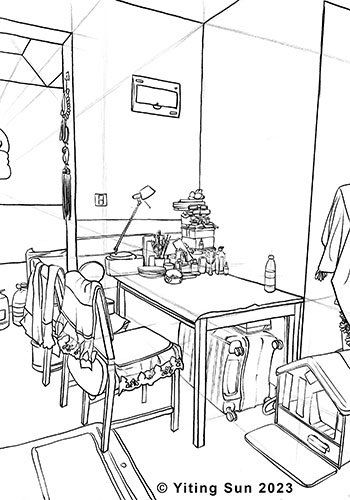
Pictured here: A sketch by Yiting Sun.
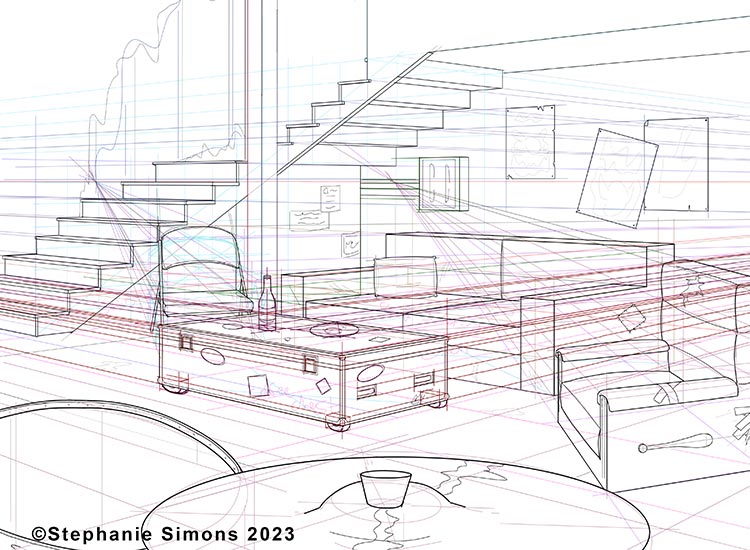
Pictured here: A sketch by Stephanie Simons.
Life drawings
Include the following:
2 full body drawings
Provide 2 full body drawings. These drawings should demonstrate your ability to draw the full body human form (not portraits) with the same sense of 3-dimensionality and structure as the perspective drawings. Include different poses from quick to long-sustained poses.
1 page of rough hand sketches
Provide 1 page of rough hand sketches to further demonstrate your ability to draw from life. It's important to plan out work and experiment with proportions, posing and line quality as part of the process of drawing. The rough hand sketches will be evaluated as part of the structure and proportions component of the marking rubric.
Examples
View the following examples of student works:
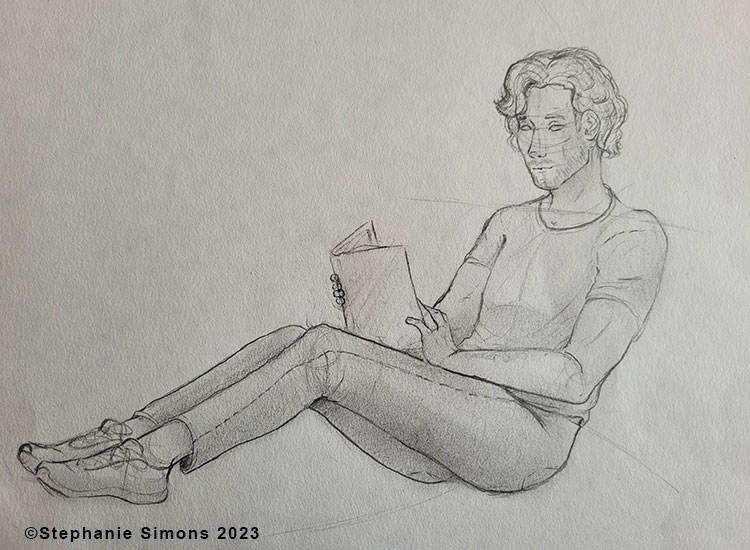
Pictured here: A life drawing by Stephanie Simons.
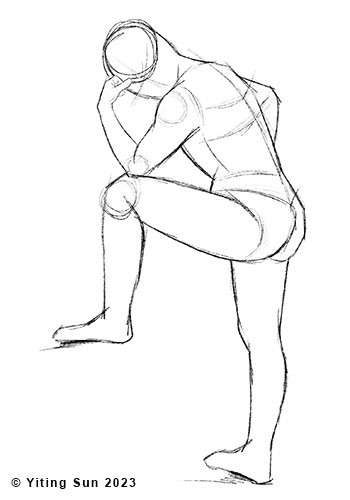
Pictured here: A life drawing by Yiting Sun.
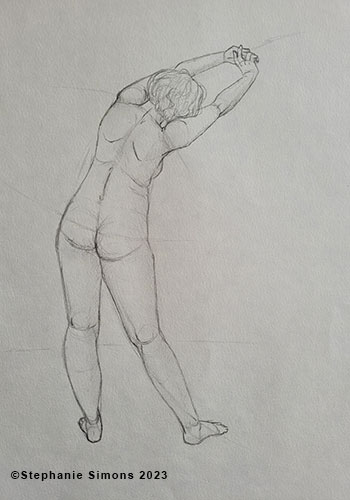
Pictured here: A life drawing by Stephanie Simons.
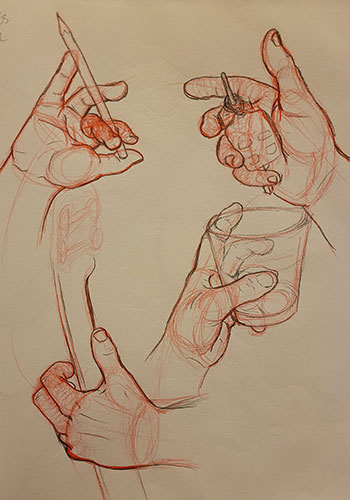
Pictured here: A page of sketches by Stephanie Simons.
Character head rotation exercise
Print the character head rotation template (PDF 66KB). Use the front view of the head as a reference and draw the 3/4 view and profile view of the same head on the same page, next to the front view of the head.
Try to imagine the head as a solid, 3-dimensional object rather than lines. Try to maintain the same “volume” and size as the original. Use the geometric shapes and the guidelines in the template to help you.
Personal, original artworks
Submit your 3 pieces of personal, original artwork. You're encouraged to send in a variety of artwork that shows the breadth of your skills and interests. We're looking for your creative potential in drawing, painting, storytelling, entertainment, characterization and design.
Examples of personal artwork include sketchbooks, paintings, caricatures, animation, sculpture, 3-dimensional work, comic/graphic novel work, etc. You're encouraged to be thoughtful and conscientious in the selection of the art to be submitted and to prioritize personal artwork samples.
Do not submit copies of existing, copyrighted work or characters.
Storyboard (4 panels)
Print the storyboard template (PDF 26KB). Use the character on the character reference sheet (PDF 49KB) to create a 4-panel storyboard with the following scenario:
- Character steps up to a door
- Finds it difficult to open
- Finally opens the door
- Character reacts to what's inside
Draw the character, the door and anything else that is essential to the scene. Don't copy the poses from the character reference sheet. Come up with character poses that best show the audience how the character is feeling and what the character is doing. Choose the camera angles that best communicate the story you are trying to tell. Draw everything free hand.
| Completed | Portfolio components |
|---|---|
| 1 clean perspective drawing and 1 page of rough sketch work | |
| 3 life drawings - 2 full body and 1 page of rough hand sketches | |
| Character head rotation | |
| 3 pieces of personal, original artwork | |
| 1 storyboard (4 panels) |
Submit your portfolio using 1 of the following 3 methods. Note that you may not alter your portfolio once it has been submitted (it will be screen captured to ensure it has not been modified in any way).
File-sharing service
You may use a file-sharing service like Google Drive, Dropbox, etc. to submit your portfolio for assessment. If using this method:
- Create a main folder using the following name structure: “[Your first and last name] Digital Animation portfolio”, e.g., John Smith Digital Animation portfolio
- Create a folder for each portfolio section within the main folder. Name these folders:
- Perspective drawings
- Life drawings
- Character head rotation exercise
- Personal, original artwork
- Storyboard
- Add your assignments to their respective folders.
- Ensure permissions of your folders are set up to allow anybody with the link to view and download the folder contents, and that access to the link will not expire.
- Send us the link to the main folder by email to . Add “Digital Animation portfolio” in the subject line. Include your name, "W" number, the program you're applying to and the link to the main folder in the body of your email.
Learn how to upload files and folders to Google Drive.
Learn how to add files and folders to your Dropbox account.
Portfolio website
You may create a portfolio website to be shared for assessment. Paid hosting and custom URL aren't necessary. If using free website providers like Wix or Wordpress, your site must be published for the link to be viewable. Note that social media pages are not acceptable portfolio websites.
If using this method:
- Your website must contain separate sections that are clearly labelled to correspond with each portfolio section:
- Perspective drawings
- Life drawings
- Character head rotation exercise
- Personal, original artwork
- Storyboard
- Uploaded images should be in a file format supported on the web - either JPEG or PNG.
- Ensure all the necessary files are uploaded to your site before you submit it.
- Email your portfolio website to . Add “Digital Animation portfolio” in the subject line. Include your name, "W" number, the program you are applying to and the link to your portfolio website in the body of the email.
- Ensure you've included the published link in your email, not a link to the web editor version of your site.
Portfolio slideshow
You may create a portfolio slideshow using an online slide creation tool like Google Slides or Canva. If using this method:
- Your slideshow must contain separate sections that are clearly labelled to correspond with each portfolio section:
- Perspective drawings
- Life drawings
- Character head rotation exercise
- Personal, original artwork
- Storyboard
- Ensure all the necessary files are included in your slideshow before you submit it.
- Ensure your share settings are set so that anyone with the link can view.
- Email the link to your slideshow to . Add "Digital Animation portfolio" in the subject line. Include your name, "W" number, the program you're applying to and the link to your portfolio slideshow in the body of the email.
PDF document
You may save all images into 1 PDF file as long as your file doesn't exceed 25MB. If it exceeds the size limit, you'll need to compress it. If it continues to exceed the size limit after compressing it, use 1 of the methods listed above instead.
If using this method:
- Collect all images and merge them into 1 PDF document.
- Each portfolio section must be clearly labelled using the titles:
- Perspective drawings
- Life drawings
- Character head rotation exercise
- Personal, original artwork
- Storyboard
- Your assignments must be added under their respective titles.
- Send your PDF as an attachment to . Add “Digital Animation portfolio” in the subject line. Include your name, "W" number and the program you're applying to in the body of the email.
Assessment
Learners in the Digital Animation program devote many hours to drawing. The development of these drawing skills enables them to draw any character, object, building, room or landscape from any point of view, and makes it appear 3-dimensional using a precise linear style.
The admissions committee will look at your portfolio for evidence of your potential to reach this goal and to be successful. Your total combined score must be a minimum of 60% for acceptance into the program.
| Developing: 0 to 5 points |
Competent: 5 to 7 points |
Exemplary: 8 to 10 points |
||
|---|---|---|---|---|
| Vanishing point | Artwork appears incomplete, missing too many details, lack of vanishing point and horizon line. | Artwork demonstrates an understanding of perspective, clear application of vanishing point and horizon line. | Artwork demonstrates an exceptional understanding of perspective, application of vanishing point and horizon line, high level of detail in drawing. | /10 |
| 0 to 3 points | 4 points | 5 points | ||
| Solid structures | Artwork feels unfinished, more dimension and details needed to better define the shape of objects. | Artwork demonstrates a clear understanding of 3 dimensional structure, good level of detail used to define the shape of objects. | Artwork demonstrates an excellent understanding of 3 dimensional structure, high level of detail used to define the shape of objects so they appear solid and realistic. | /5 |
| Use of lines/amount of detail | Artwork feels unfinished, line quality is choppy and makes some objects look unclear, more details needed. | Artwork demonstrates a good level of detail applied to give the objects character and style. Good line quality, clean line work evident. | Artwork demonstrates outstanding line quality and was finished with a great deal of patience evident by the high level of detail present. | /5 |
| Total points | /20 |
| Developing: 6 to 10 points |
Competent: 11 to 15 points |
Exemplary: 16 to 20 points |
||
|---|---|---|---|---|
| Accuracy drawing the human figure | The human figure is not drawn to the correct proportions or structure. Drawing is missing a significant amount of detail. | Demonstrates a moderate understanding of 3-dimensional form. | The human figure is drawn to the correct proportions and structure and demonstrates an excellent understanding of 3-dimensional form. | /20 |
| 0 to 5 points | 5 to 7 points | 8 to 10 points | /10 | |
| Hand structure and proportions | Either structure or proportions need more development. | Good structure and proportions. | Excellent structure and proportions. | |
| Total points | /30 |
| Developing: 0 to 2 points |
Competent: 3 to 4 points |
Exemplary: 5 points |
||
|---|---|---|---|---|
| Good drawing structure/line quality | The character head is not drawn to the correct proportions and structure. Poor line quality and lack of 3-dimensional understanding is evident. Did not make use of all guidelines provided. | The character head is mostly drawn to the correct proportions, demonstrates a moderate understanding of 3-dimensional form, clean line quality. Makes good use of the guidelines provided. | The character head is drawn to the correct proportions and structure, demonstrates an excellent understanding of 3- dimensional form and has successfully included variation in line quality to denote weight. | /5 |
| Volume | Volume and shape are not consistent across all 3 views. | The volume and shape are mostly consistent, some minor fixes needed. | Good consistency in volume and shape. Effective use of guidelines provided. | /5 |
| Accuracy | Both additional views of the character head exhibit proportional and shape issues. Accuracy of the drawings is greatly decreased. | Additional views of the character head exhibit minor proportional and shape issues. Accuracy of the drawings can be greatly improved with some minor tweaks. | The character is drawn to the correct proportions and structure, demonstrates an excellent eye for details and high level of accuracy in the application of those details. | /5 |
| Use of guidelines | Didn't use guidelines. | Used some guidelines. | Good attention to details with accurate use of guidelines. | /5 |
| Total points | /20 |
| Developing: 0 points |
Competent: 1.5 points |
Exemplary: 2.5 points |
||
|---|---|---|---|---|
| Elements of design: Line, texture, colour, shape/form, space and value | Artwork submission shows a basic level of understanding the elements of design, more practice needed. | Artwork submission demonstrates planning and shows moderate awareness and application of the elements of design. | Artwork submission demonstrates careful planning and shows a high degree of awareness and application of the elements of design. | /2.5 |
| Variety and quality | Artwork submission demonstrates minimal variety of style or subject matter, more variety and exploration of subject matter would strengthen the portfolio. | Artwork submission demonstrates a good variety of style or subject matter. Effort and perseverance evident in the quality of work submitted. | Artwork submission demonstrates an excellent variety of style or subject matter. Effort and perseverance evident in the quality of work submitted. | /2.5 |
| 0 to 2 points | 3 to 4 points | 5 points | ||
| Craftsmanship/skill | Artwork submission demonstrates a developing artistic ability but more practice is needed. | Artwork submission demonstrates a good artistic ability and willingness to devote time toward skill development. Good attention to detail. | Artwork submission demonstrates a high level of artistic ability and willingness to devote time toward skill development. Excellent attention to detail. | /5 |
| Total points | /10 |
| Developing: 0 to 2 points |
Competent: 3 to 4 points |
Exemplary: 5 points |
||
|---|---|---|---|---|
| Story structure | Drawings are unclear and story does not follow the structure. | Story follows the structure; drawings are clear but setting and environment is basic. | Story follows structure and is unique, clever and easy to understand. | /5 |
| Poses | Character poses lack clarity and appear stiff. | Poses are clear but basic. | Poses are exemplary and enhance the story. | /5 |
| Camera/shots | Little use of camera angles or shots that add to the story. | Some use of camera angles or shots that add to the story. | Good use of camera angles or shots that add to the story. | /5 |
| Accuracy | Character drawing lacks consistence across the 4 panels. Volume and structure issues present. | Character drawings are mostly consistent across the 4 panels. Minor volume and structure issues. | Character drawings are consistent across the 4 panels. Good level of accuracy demonstrated. | /5 |
| Total points | /20 |
Contact us
For inquiries and assistance, contact

